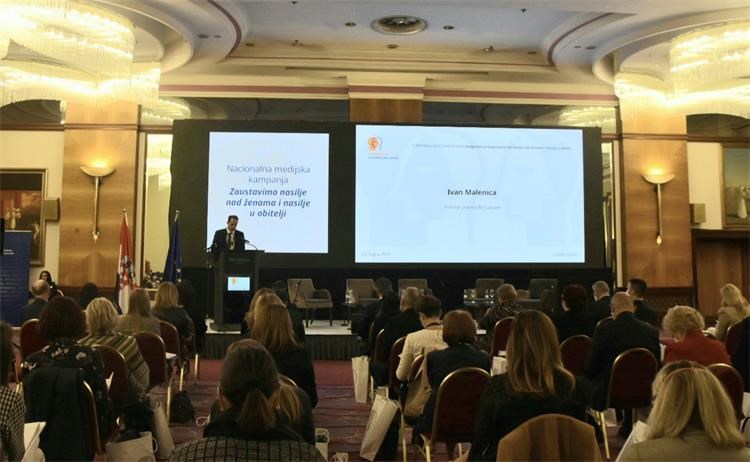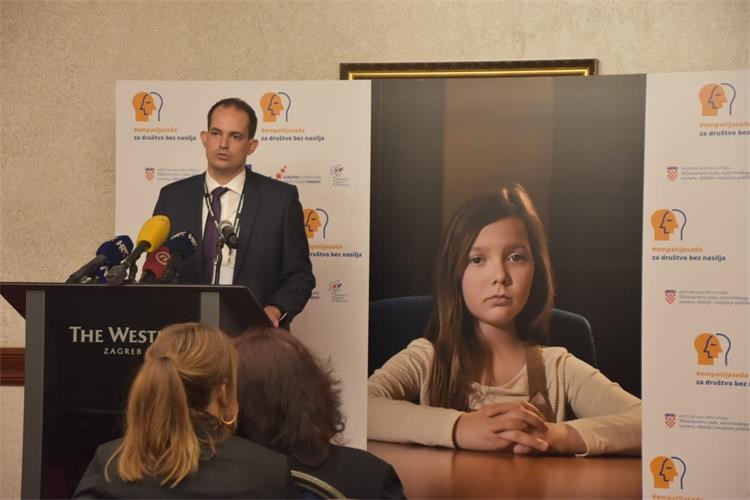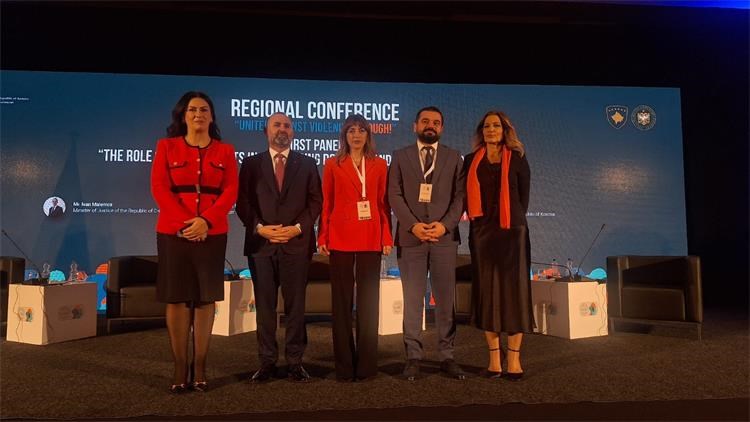- Published: 22.09.2021.
Minister Malenica at the conference “An Integrated Approach to Protection from Violence against Women and Domestic Violence”
On the occasion of the National Day of Combating Violence against Women in Croatia, the Minister of Justice and Public Administration participated in the high-level conference “An Integrated Approach to Protection from Violence against Women and Domestic Violence”
The conference was attended by Prime Minister Andrej Plenković, Deputy Prime Minister and Minister of the Interior Davor Božinović, European Commissioner for Equality Helena Dalli, Minister of Labour, Pension System, Family and Social Policy Josip Aladrović, Vice-President of the European Court of Human Rights Ksenija Turković, President of GREVIO Iris Luarasi, Ombudswoman for Gender Equality Višnja Ljubičić and Ms Dubravka Šimonović, former Special Rapporteur on violence against women, its causes and consequences (2015-2021).“Today’s conference is an opportunity to look at our criminal law system of victim protection, to which the Ministry of Justice and Public Administration has applied a dual approach: by improving the legislative and institutional framework, and by strengthening the capacities of the victim and witness support departments”, said Malenica in his speech, stressing the multilayered nature of responsibility for combating violence and the need for commitment by all stakeholders: government institutions, the judiciary, civil society and each and every one of us.
He reminded that the Croatian Government had made significant steps forward in strengthening victim protection mechanisms and sanctioning perpetrators over the last few years. The 2020 amendments to the Criminal Code and the Protection against Domestic Violence Act tightened penalties for perpetrators, enabled a better quality differentiation between misdemeanours and crimes, abolished the criminal offence of sexual intercourse without consent and introduced the state of long-term suffering.
The amendments also increased penalties for domestic violence and crimes against sexual freedoms to a range from 1 to 10 years, compared to the previous penalties’ range from 3 months to 8 years.
In 2021, new amendments to the Criminal Code were adopted, introducing ex officio prosecution for sexual harassment instead of the previous prosecution upon the victim’s motion within 3 months. A new criminal offence of "abuse of a recording with sexually explicit content” was introduced to sanction perpetrators of crimes related to revenge and deepfake pornography. The penalty envisaged for such crimes is 1 to 3 years’ imprisonment.
Furthermore, the meaning of the term “closely related person” was extended to include current or former intimate partners. Security measures for compulsory psychosocial treatment, removal of the violent partner from the common household and prohibition of the performance of an office or activity were amended so as to make them obligatory. The security measure of protective supervision, which was previously applied ex lege, is now pronounced during judgement delivery. The result of this amendment is that violation of the imposed measure represents a crime of failure to comply with court judgement. A catalogue of criminal offences without a statute of limitation was extended to include grave criminal offences of sexual abuse and exploitation of children from Article 166, paragraph (2). The above amendments have ensured better quality tools for sanctioning domestic violence crimes and crimes against sexual freedom.
“Being aware that a quality regulation requires quality application, the Ministry of Justice and Public Administration has initiated the establishment of 15 family departments in the seats of county courts. In addition to judges and judicial officials, starting next year these departments will include other professional staff such as psychologists. This will ensure a systematic victim support during court proceedings and specialisation of judges for family cases. Moreover, additional trainings will be provided to empower employees in family departments as well as lawyers representing parties in such cases”, added the Minister.
Furthermore, the Ministry has been working on expanding victim and witness support departments in Croatian courts. At the moment, such departments exist in the county courts in Zagreb, Vukovar, Osijek, Zadar, Split, Sisak and Rijeka, and have provided support to over 41 thousand victims since 2008. For the fourth consecutive year, the Ministry has been implementing the programme “Network of Support and Cooperation for Victims and Witnesses of Criminal Offences” in cooperation with 11 civil society organisations. The programme offers emotional and practical support victims and witnesses as well as free-of-charge psychological and legal counselling, and accompaniment of victims to proceedings before government institutions. 9 million Kuna have been allocated for this Network so far.
In 2013, in cooperation with the Victim and Witness Support Service Croatia, the Ministry established the National Call Centre for Victims of Crime and Misdemeanour, and since this year it has been available to victims 24/7 via free hotline 116 006.
“Violence is not only a problem between the perpetrator and the victim, it concerns all of us as a society and a country. An integrated approach and cooperation is the only correct way to combat violence and provide systematic support to victims”, concluded the Minister.


